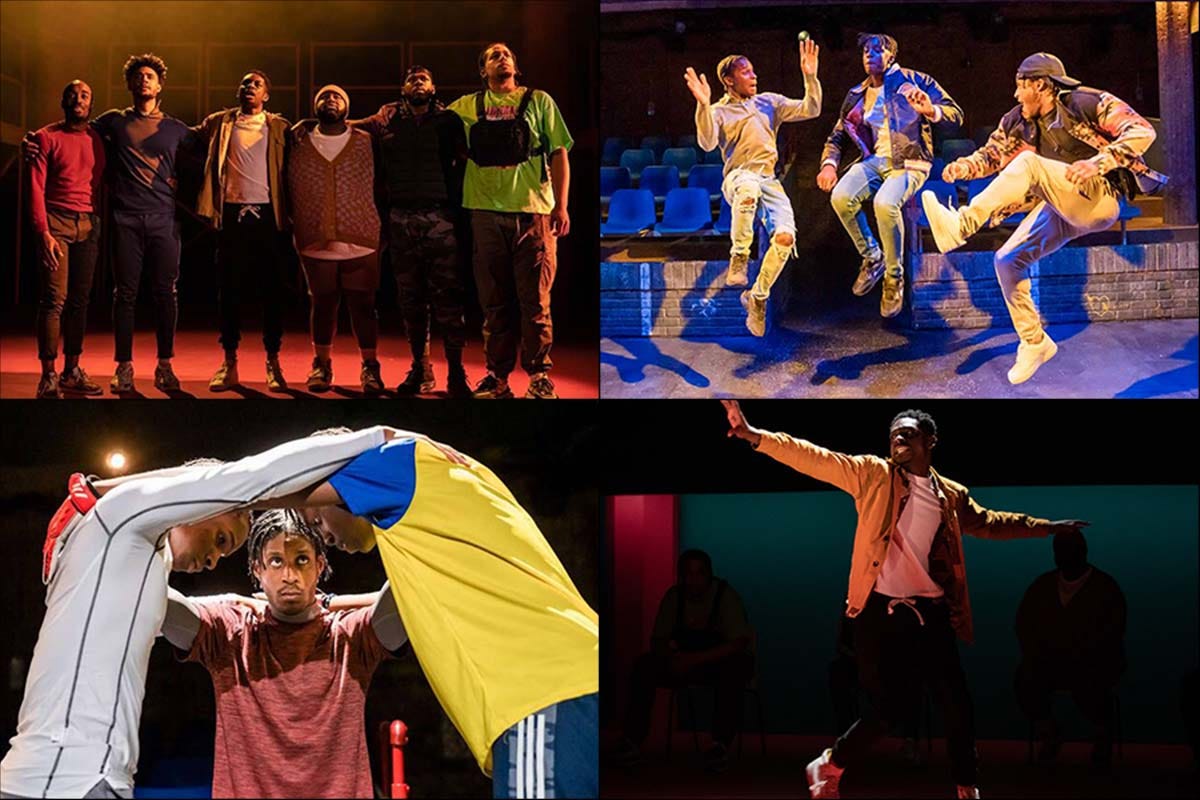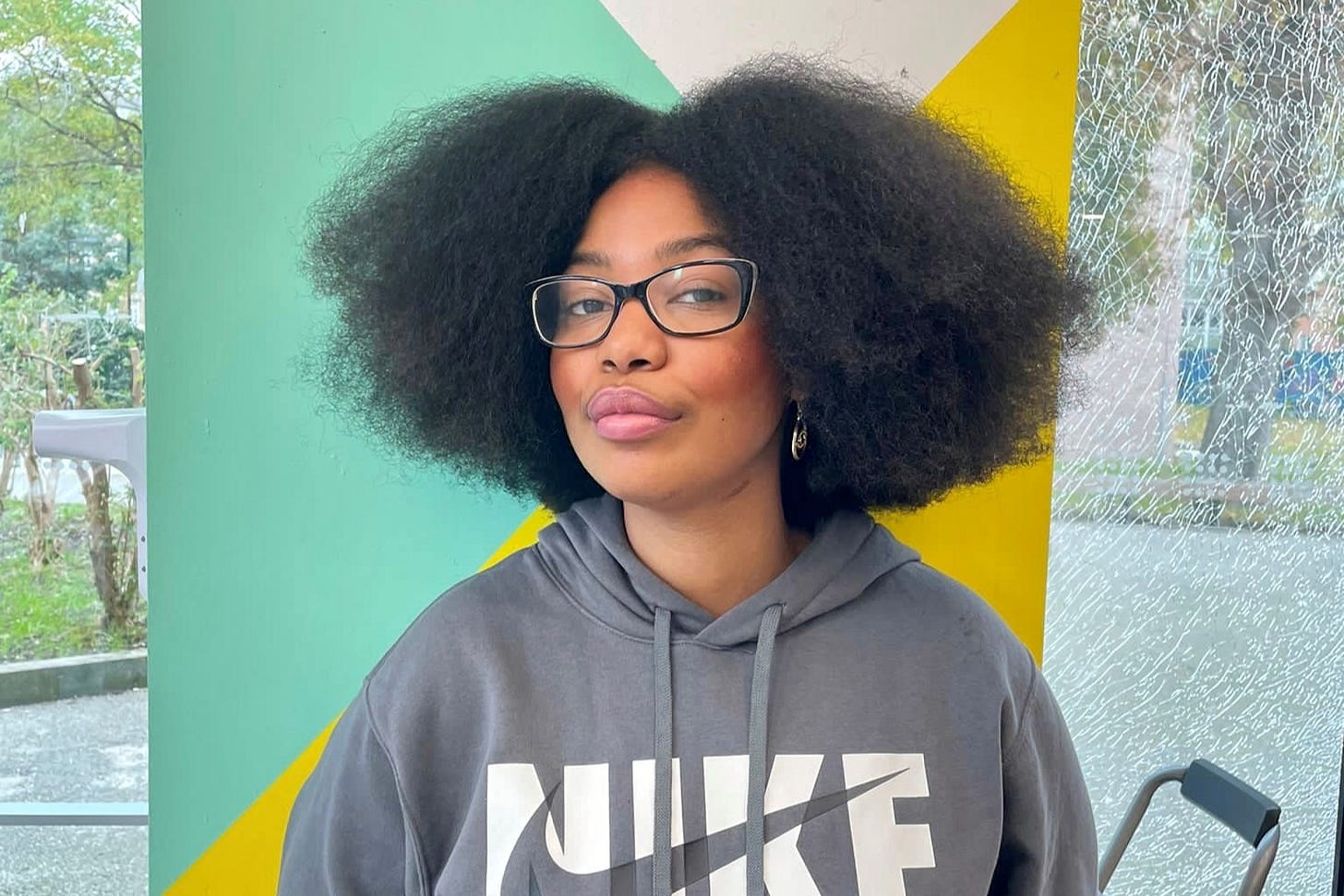Monaé Robinson wants to make Afrofuturist art.
The director and facilitator talks Red Pitch, For Black Boys, and House of Ife. PLUS: The Keeper's Daughter's neon-electro adaptation of The Time Machine is out on tour.
Hello, and welcome to The Crush Bar, a weekly newsletter about theatre written by me, Fergus Morgan.
Each issue features an interview with an exciting, emerging theatremaker - or several - and gives them a chance to be explicit about where they want to go and what help they need to get there. Maybe you, reader, can give it to them, or put them in touch with someone who can.
You can read more about why I’m doing this here, and you can sign-up to get it delivered straight to your inbox using the button below.
If you are interested in promotional opportunities with The Crush Bar, there are a range of options available, from short shout-outs, to longer mentions, to entire issues. Details, stats and prices can be found by clicking on the button below.
Monaé Robinson – director, facilitator, and a whole lot more – is a bit tired, and with good reason.
The twenty-five-year-old has been assisting on two shows over the last few weeks – Ryan Calais Cameron’s acclaimed For Black Boys Who Have Committed Suicide When The Hue Gets Too Heavy at the Royal Court, and Beru Tessema’s upcoming House Of Ife at the Bush Theatre, where she is resident director – and has just finished on a third, Tyrell Williams’ Red Pitch, also at the Bush.
Everything, Robinson says, seems to have come at once. “I went to a meeting about For Black Boys on the week that Red Pitch opened, and I found out I’d got the role the morning after press night,” she remembers. “The Royal Court rang me up and said that Ryan wanted me involved. All I can say is that I felt like I had left my body. It was insane.”
It was also something of a validation. Being offered assisting roles on all three shows confirmed to Robinson that she is on the right track. It proved to her that the stories she values could be told on stage, and that she could be involved in the telling. It assured her that there was room for a theatremaker like her – with her expertise, attitude, and ambitions – in the performing arts industry.
“As researcher and a thinker, I bring a lot of ideas and theory into rehearsal rooms, but I also offer a lot of love and care and understanding in those spaces, too,” Robinson explains. “I am still young and emerging, and I am still thinking about the industry and the changes I want to make in it. And I think those are exactly the reasons why I was included on these shows.”
Those two aims – the desire to make boundary-breaking work, and the desire to do so in an inclusive, compassionate fashion – epitomise the twin poles of Robinson’s career. She is driven by both ambition and empathy, by both a personal passion to create cutting-edge art, and a responsibility to make a difference in doing so. It is not always an easy tightrope to walk.
“To be perfectly honest, I do feel a lot of pressure to do the right thing all the time,” Robinson says. “Sometimes you can be so focused on community stuff that you forget about yourself, and sometimes you can be so focused on your own work that you forget about your community. My main aim is to balance those two things throughout my career, and to merge them where I can.”
“I bring a lot of ideas and theory into rehearsal rooms, but I also offer a lot of love and care and understanding…”
Robinson grew up in Peckham, and fell in love with theatre through outreach programmes at the Young Vic. Theatre, she says, was something of a safe space for her in her teenage years. “When I was growing up, there was a lot of crime and violence in Peckham,” she says. “We used to say it was a war-torn community. Theatre was a very healing, therapeutic place for me.”
Robinson originally wanted to be an actor, and went to Goldsmiths to study theatre and performance. It was while studying there, though, that she discovered she found more creative fulfilment through directing. It was also at university, through a graduate project that “played around with the concepts of slavery and AI technology”, that she discovered a passion for Afrofuturism.
“There are limits placed on Black artists,” Robinson says. “There are limits to the jobs we can do and the roles we can play and the stories they can tell. I like Afrofuturism because it is a complete rejection of those limits. We definitely don’t see enough of it on stage. When it is done well, it can be incredible.”
Alongside and after her studies, Robinson continued to be involved in outreach programmes, but as a facilitator instead of a participant, in roles with Frantic Assembly, the Royal Court, and King’s College London, and elsewhere. After graduating in 2020 – into an industry ravaged by the Covid-19 pandemic – she started working as participation producer at Theatre Peckham.
“It was scary, graduating during the pandemic, but I didn’t give in to that fear,” she says. “I was very lucky to have the job at Theatre Peckham, because it meant I could help young people and adults come together and heal when they needed it most. I’m not religious, but I am spiritual and I believe we have to help each other, and I felt like I was in exactly the right place at the right time.”
While at Theatre Peckham, Robinson directed John Akinde’s Oja as part of the venue’s Young, Gifted and Black festival. Then, in late 2021, she applied for the role of resident director at the Bush Theatre. She did not have much hope – “I went to a workshop with a bunch of directors with a lot more experience than me,” she remembers – but she landed the job, and is loving it, despite how busy it keeps her.
“Theatre can change society,” she says. “I really, really believe that. The theatre industry shapes the arts industry, which shapes the world. To be involved in making work that you know has the power to do that is incredible. Red Pitch and For Black Boys are both shows like that. In those rehearsal rooms, it feels like you are on the edge of glory.”

What do you want to do?
Lots. I want to have an Afrofuturist show on at the Barbican. I want to get more involved in writing and directing films. I want to explore telling stories in different ways, in different spaces, in different visual languages. And I think I want to do all that through a company that I create.
I would also like to start writing critical theory under a pen name, like bell hooks. Mine – don’t laugh – would be Melina Sharp. I started an interview project during lockdown called The Black Critique, which I haven’t launched yet, and I’d like to keep doing stuff like that.
What support do you need to get there?
If I could get a phone call from anyone, it would be from Jordan Peele. I love the way his work merges critical theory and art, and I see a lot of that in myself. That is the sort of world that I want to explore. If anyone can help me do that, then get in touch.
How can people find out more about you?
People can come and see the shows that I am involved in. For Black Boys is on at the Royal Court until May 7, and House of Ife opens at the Bush Theatre next week, too. I’m going to sort out a website for myself soon, but for now the best place to catch me is on Twitter and on Instagram.
Before the end of this week’s newsletter, I want to give a quick shout-out to East Anglia-based company The Keeper’s Daughter and its show The Time Machine, which is currently on tour, and set to visit Brighton Fringe on two weekends in May.
Adapted and directed by artistic director Mark Finbow, it takes HG Wells’ classic sci-fi novella and turns it into an hour-long adventure for the whole family, incorporating spoken-word, puppetry, and The Keeper’s Daughter’s characteristic neon-electro aesthetic.
To book tickets for any dates, visit The Keeper’s Daughter’s website, and to enquire about hosting a performance of The Time Machine, email Mark here.
Anything you can do to support The Crush Bar is hugely appreciated. There are three helpful things in particular: you can subscribe using the button above, you can share it, either on social media or by forwarding it to anyone who might be interested, and you can donate to my Ko-Fi account using the button below.
If you want to get in touch with me to ask about anything, or to suggest someone who deserves a shout-out in this newsletter, you can reach me on Twitter - I’m @FergusMorgan - or by simply replying to this email. That’s all for now. Thanks for reading.
Fergus Morgan



